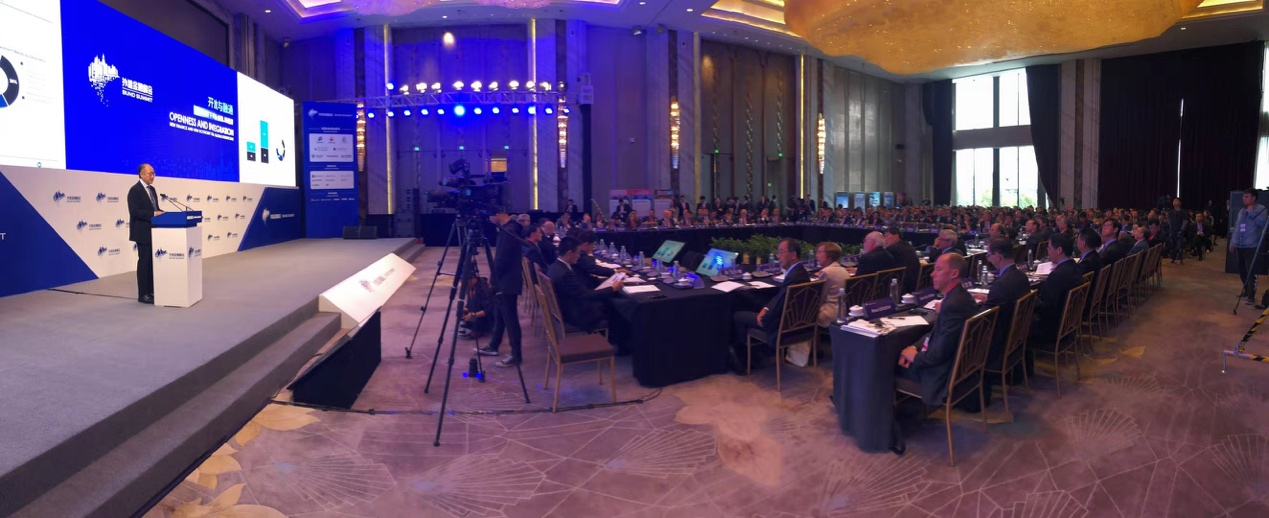02:44

Hundreds of representatives from foreign and domestic financial institutions are gathering in Shanghai to discuss the opportunities and challenges ahead, as China opens the door of its financial market wider to foreign banks and securities.
The discussions are ongoing at the first Bund Summit, a three-day conference that started on Sunday in Shanghai.

Financial openness, blockchain technology and low interest rates are three of the major topics being discussed at the first Bund Summit. /CGTN photo
Financial openness, blockchain technology and low interest rates are three of the major topics being discussed at the first Bund Summit. /CGTN photo
Financial openness and integration
Japan's Nomura Holdings in March got the green light to set up a majority-controlled securities joint venture in China.
Toshiyasu Iiyama, Nomura Holdings' China Committee head, said the company is waiting for the final nod for official operations.
"As the first bunch of foreign banks coming into security industries as a majority holder, they are quite beneficial to do it as a first player, and jointly with Chinese financial institutions to cultivate the new market," said Iiyama.
China has relaxed foreign capital limits in securities, and announced in mid-October that overseas financial institutions can establish foreign-invested insurance companies, and become shareholders of these new firms.
Tu Guangshao, executive chair of the Bund Summit Organizing Committee, said China has accelerated its financial opening-up, offering enormous opportunities for global partners and injecting vitality for further reform.

China has given foreign entities more access to its financial markets. /CGTN photo
China has given foreign entities more access to its financial markets. /CGTN photo
More than 200 domestic and overseas financial institutions are attending the meeting.
Peter Wong, HSBC Asia Pacific Chief Executive, said the most important step is allowing foreign banks to have more deposits, "because as far as the capital is concerned, there is no lack of capital. They can put capital into the country very easily, but the one thing that the foreign banks lack is actually liquidity, without liquidity it is very hard to do lending."
With increasing demand from individual investors for wealth management, China's financial reform and policy relaxation is generating huge opportunities for foreign banks and securities. But experts say the policy doesn't guarantee success in China. Local strategies, networks and digital solutions also matter in the long run.
Blockchain technology boosts financial innovation
"Blockchain technology has been widely used in many fields, which can improve settlement and clearing efficiency, reduce transaction costs, and effectively promote the innovation and application of digital currency," said Chen Yuan, who is the chairman of the Bund Summit Organizing Committee and chairman of China Finance 40 Forum (CF40) Standing Council.
But the risks that new technologies may bring cannot be ignored, especially when their applications are in financial business scenarios, they need to be alert to the security vulnerabilities of new technologies and strengthen the guidance and regulation of new technologies.

Blockchain technology is expected to boost financial innovation but the risks cannot be ignored. /VCG photo
Blockchain technology is expected to boost financial innovation but the risks cannot be ignored. /VCG photo
Lu Lei, a member of the CF40 and deputy director of the State Administration of Foreign Exchange (SAFE), revealed that the SAFE is promoting the application of blockchain and artificial intelligence technologies in cross-border trade financing and macro-prudential management.
However, Lu also said, "When we are not sure what direction a certain format will develop, we must pay attention to risk management. The basis of risk management is a truly effective financial infrastructure, and we must grasp the construction of modern financial infrastructure. The core link further strengthens the construction of payment clearing, depository and settlement, transaction reporting, and central counter-party for the digital financial era to achieve lower transaction costs and lower systemic risk probabilities."
Actively respond to the 'new normal' of low interest rates
As global economic growth slows, low interest rates, zero interest rates and even negative interest rates have been adopted by central banks worldwide.
Lord Adair Turner, former chairman of the UK Financial Services Authority, believes global savings rates may continue to exceed falling investment demand, and low interest rates will be the "new normal" for decades to come.
Jim Yong Kim, the 12th president of the World Bank, pointed out that despite the current low return on investment, the world is facing huge infrastructure construction needs, especially in emerging markets, where infrastructure investment demand will explode, which is a big opportunity.